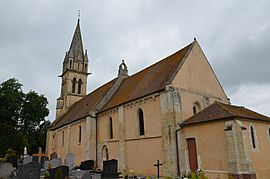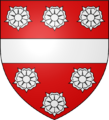Magny-le-Freule facts for kids
Quick facts for kids
Magny-le-Freule
|
||
|---|---|---|
 |
||
|
||
| Country | France | |
| Region | Normandy | |
| Department | Calvados | |
| Time zone | UTC+01:00 (CET) | |
| • Summer (DST) | UTC+02:00 (CEST) | |
| INSEE/Postal code |
14387 /
|
|
Magny-le-Freule was a small village, also known as a commune, located in the northwest of France. It was part of the region called Basse-Normandie. This area is also known as the Calvados department.
On January 1, 2017, Magny-le-Freule joined with other nearby villages. They formed a new, larger commune named Mézidon Vallée d'Auge. This means Magny-le-Freule no longer exists as a separate commune.
Contents
What Was Magny-le-Freule?
Magny-le-Freule was a quiet place in the French countryside. Like many small communes in France, it had its own local government. It also had a unique history and local traditions.
Where Was Magny-le-Freule Located?
Magny-le-Freule was situated in the Calvados department. This department is famous for its beautiful landscapes. It is also known for its apple orchards and dairy farms. The area is part of the larger Basse-Normandie region. This region is in the northwestern part of France.
The Calvados Department
The Calvados department is named after a group of rocks. These rocks are found off its coast. The department is well-known for its rich history. It played a big role in World War II. Today, it is a popular place for tourists. They come to see its beaches and historical sites.
Why Did Communes Merge?
Communes sometimes merge to become bigger. This often happens to make local government more efficient. When villages combine, they can share resources better. This might include services like schools or public transport. It can also help them manage their budgets. The goal is to improve life for everyone living there.
The New Commune: Mézidon Vallée d'Auge
When Magny-le-Freule merged, it became part of Mézidon Vallée d'Auge. This new commune is much larger. It includes several former villages. This merger helps these communities work together. They can plan for the future more effectively.
Images for kids
See also
 In Spanish: Magny-le-Freule para niños
In Spanish: Magny-le-Freule para niños




